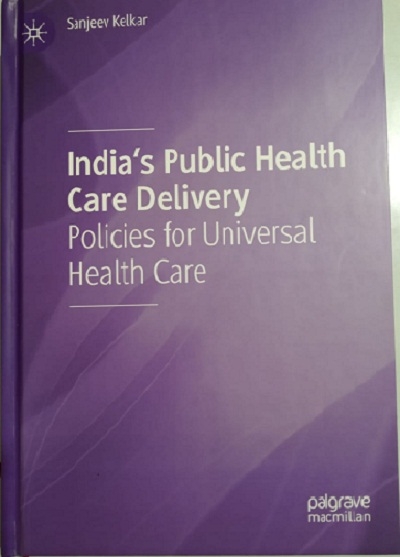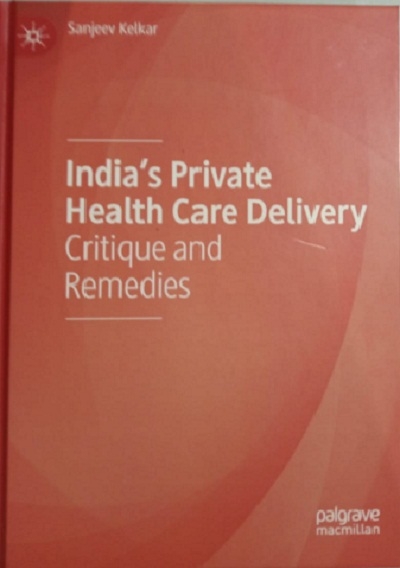A Review on India’s Health Care Issues

By Veteran Gp Capt R V Jawalikar
Recently international editions of Dr. Sanjeev Kelkar’s two books - India’s Private Healthcare Delivery: Critique and Remedies and India’s Public Health Care Delivery: Policies for Universal Health Care were published by the famous house of Palgrave Macmilan.
These books extensively deal with highlighting the present lacunae in the Public and Private Health Care Delivery System in India and suggest exhaustive measures to bring about a sea change in effectiveness through a thorough overhaul.
I have read both these books and am highly impressed by the contents.
The issues brought forth in these books need speedy acceptance at the highest levels and implementation at grass roots level.
This is an outcome of his 6 years of hard work of the author in solitary confinement, 4 major extensions, 940 pages in two volumes, three times rejections from major publishers, single author - it has all paid off now. It's an international edition for both volumes, contract with Singapore, printed in Europe; Dr Kelkar's lifetime work has finally seen the light of the day. And it is all backed by 45 years of experience in the field of medicine and health care - practicing, teaching, imparting training - from Mumbai to Mercara (Medikari - Coorg), Bengaluru to Agartala, Nagpur to the interiors of rural West Bengal (Sonamukhi/ Bolpur) and a fruitful partnerships along the way with Novo-Nordisk Education Foundation- Training doctors for diabetes treatment in collaboration with the Australian University in Newcastle - apart from his seminal work in the area of Tuberculosis.
Dr Kelkar has, in very simple, straightforward and easy to understand language put across the essentials of ‘WHAT AILS THE HEALTH CARE SYSTEM IN INDIA’ - in a most Holistic and Comprehensive fashion.
The writing makes for an uninterrupted reading - from one topic to another, each interlinked with one another - the flow is unbroken and the subject within the grasp of even laypersons like us.
The acceptance of the factual lacunae in our Private & Public Health Care Delivery System by the Policy Planners and effective steps to implement the Solutions brought out by Dr Kelkar - is the dire need of the hour - which will enable our nation in marching forward to a utopia of health and happiness.
Incidentally, we have had 41 Health & Family Welfare Ministers in the Central Government, over the past 74 years, having various tenures in office.
*Out of them only the following 7 seem to have had a reasonable enough tenure and succeeded in providing some sort Direction, Guidance and Involvement in Health Care Policy Planning and Infrastructure Implementation.*
1. Rajkumari Amrit Kaur - 10 yrs.
2. Dr. Sushila Nayyar - 5 yrs
3. Raj Narain 1yr 3 m
4. Dr. C P Thakur 2 yrs 1 m
5. Dr. Anbumani Ramdoss 5 yrs
6. J P Nadda 5 yrs
7. Dr. Harshavardhan Goel From 2019
Astonishingly, only 4 of the 41 Ministers are of Medical background; and more Surprisingly, Raj Narain, with no Medical Background what so ever, appears to have contributed significantly to focus on Affordable Public Healthcare for the Poorer Sections.
But the moot point that comes to mind is - what about the bureaucrats in the Health Ministry at various levels? What has been their contribution?
The same questions would arise with respect to the functioning and performance of the State Governments.
It is indeed shameful, even after 74 years of Independence, that we, as a nation, are still far from having a decent, patient friendly, affordable health care system within the reach of the last, poorest of the poorest citizen in the remotest of the remotest corner of our country.
India’s Public Health Care Delivery: Policies for Universal Health Care
The book describes the massive change India has undergone over the years and emphasizes that out of the box new measures of managing health are mandated.
 The author laments that the present pitiable state of India’s Public Health Care Delivery is not just because of any perceived lack of resources or health care specialists or visionary ideas, but mainly due to its dismal planning and implementation. He further goes on to give us a detailed and reasoned analysis of the defects of the entire structure and function of Indian public health care system.
The author laments that the present pitiable state of India’s Public Health Care Delivery is not just because of any perceived lack of resources or health care specialists or visionary ideas, but mainly due to its dismal planning and implementation. He further goes on to give us a detailed and reasoned analysis of the defects of the entire structure and function of Indian public health care system.
The author offers wide-ranging and exhaustive blue print of how the public health care delivery can be transformed and remedied comprehensively and effectively, using the already available resources. The supportive arguments are well reasoned and most logically laid out.
Of course, this will require a sweeping re-examination of some established ideas, considered untouchable, and discarding many of these, especially in Primary Health Care and its structure, the same needs done.
The book charts out the future for the entire public health care structure and also its various nodal and grass root functions. It rationalizes and explains how the existing key components can be restructured with proper work force allocation, hitherto grossly inadequate, including professionals from other supportive training backgrounds if so required. High quality work force creation and its deployment will guarantee that an unsolved problem is effectively given a solution.
The book draws out and emphasizes an elaborate road map to a total solution that will help India achieve its goal of Universal Health Care in no uncertain terms and reflecting the full confidence of the learned author,
India’s Private Health Care Delivery: Critique and Remedies:-
The author has discussed how the Private Health Care has its roots in the good old neighborly family doctor, the small maternity homes and nursing homes in the neighborhood and their positive contributions to family health care. However, once the market economy entered the scenario, proliferation of private medical colleges and the mushrooming huge capitation fees ensured that the structure, function and the true nature of Private Health Sector Care got out of hand and became unaffordable to the common person.
 Not denying the essentiality and big benefits of high tech equipment, expertise and expenditure required on procuring, establishing and maintaining the most modern infrastructure and facilities, the author recommends ways in which the focus can shift from more return on investment to better understanding of the health scenario, a sort of reorganization vis-a-vis the public health care systems and integrating all available facilities in an optimum manner to provide holistic health care at affordable rates without in any way jeopardizing the interests of safety, maintainability and efficiency of the corporate structure.
Not denying the essentiality and big benefits of high tech equipment, expertise and expenditure required on procuring, establishing and maintaining the most modern infrastructure and facilities, the author recommends ways in which the focus can shift from more return on investment to better understanding of the health scenario, a sort of reorganization vis-a-vis the public health care systems and integrating all available facilities in an optimum manner to provide holistic health care at affordable rates without in any way jeopardizing the interests of safety, maintainability and efficiency of the corporate structure.
The meticulous, intelligent and practical remedies suggested by Dr Kelkar in this respect make a lot of sense and aim for the public good.
In addition, the book analyses the reluctance of the private health care sector to Indian Government’s reforms like the National Medical Commission, NEET, Clinical Establishment Act and the new boost to the traditional medicine by the Indian government. The author has also discussed some critical and controversial areas like profiteering in Pharmaceutical Industry – the reasons and solutions for a reasonable middle path; the Capitation Fee Colleges and their benefits versus problems; Integration of Medical Systems, Ayushman Bharat Scheme, Health Insurance and Public Private Partnership on a massive scale.
I sincerely hope both the books get the attention of the planners and implementers and also that Dr Kelkar gets personally invited to lead in the “Mission Execution” of this “HEALTH FOR ALL” vision - in some way or the other.